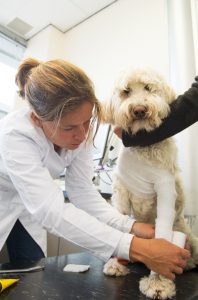By Joanna Moritz

The less stressed a dog is, the easier it is for the vet to examine and treat him © Can Stock Photo/IvonneWierink
Nobody likes going to the vet’s office with a sick pet. But here are some simple rules to follow that will make your trip more pleasant for you, your dog and the office staff – and that’s a win-win-win.
1. Practice Makes Perfect
The less stressed your dog is for an exam, the better for everyone involved. So: If you have a puppy or a small dog, put him on your washer or dryer occasionally and practice touching him all over – and give him treats while you do it. This will help him feel more comfortable with the slippery metal surface of the exam table, and learn that being handled in this way is nothing to worry about – indeed, he gets treats if he puts up with his human harassing him. If the dog seems stressed, then slow down, use more treats and do shorter practice sessions. If you have a large dog, do the same thing, minus the washer/dryer.
2. Reward Good Behavior
Bring the dog’s FAVORITE treat or toy. This will ensure you can reward good behavior. Be generous! This has a bonus effect of counter conditioning. The vet cannot be that bad in the dog’s eyes if he gets treats or his favorite ball during the visit. The exception to this rule is if your dog is supposed to be fasting before his visit. Usually before surgery or sometimes for certain tests your dog needs to have an empty stomach, but your vet will let you know.
3. Leash the Dog
This is a safety rule as well as for the peace of mind of those around you. Your dog may be brilliant off-leash but how is everyone else in the waiting room supposed to know that? If there is someone in the waiting room with a dog-aggressive dog who is on a leash, they may well have a mild panic attack when they see you walk in with an off-leash dog. Have the courtesy to follow the rules, if not for your sake, then for others’. The vet’s office is neither the time nor the place to show off your off-leash skills.
4. Coast Is Clear
Poke your head in and make sure the coast is clear before entering and go through the door before your dog. This is not about training, but safety – you don’t know what kind of vicious parrot or pot-bellied pig is behind that door. This is a great time to use the “wait” you learned in class.
5. Don’t Say Hello
Don’t let your dog “say hello” to the other dogs. You do not know if they are friendly, and keep in mind that dogs are far less tolerant when they are in a stressful situation. All dogs need personal space, just like humans, and they may need much more space than usual if they are sick or in pain. Also keep in mind that some pets may be contagious.
6. Keep It Honest
Be honest with your vet. Even if what your dog is doing is embarrassing or scary – I promise you, they have seen or heard worse. Behavior problems may be linked to medical problems so if your dog is likely to bite, say so. If the dog has been growling at other dogs or people lately, say so. If he does not like having his feet touched, say so. It is only fair that your vet has the whole story. If he/she does not accept this information in an understanding manner and take steps to mitigate the difficulty, find a different vet.
7. Ask Questions
Ask “why.” Ask until you understand. Then go home and do some more research so that you can understand better. YOU are your pet’s voice and the only one responsible for his health and happiness. No reputable vet will have a problem with answering your questions if you phrase them nicely (although you might run out of time in the appointment). If you understand what is going on with your dog, you can better advocate for his or her health. If your vet will not answer your questions or acts offended when you show an interest in your pet’s health, again, find a different vet.
Remember, even professionals ask for help sometimes. If you are having trouble with your dog’s behavior at the vet’s office, get another opinion from a professional behavior consultant.
This article was first published in BARKS from the Guild, March 2015, p.34. For more great content on all things animal behavior and training, you can sign up for a lifetime, free of charge, subscription to the digital edition of BARKS from the Guild. If you are already a subscriber, you can view the issue here.
About the Author
Joanna Moritz is the owner of Fur and Feather Works LLC in Reno, Nevada. For the past 14 years she has been working professionally with dogs, cats, parrots and other small animals, using positive reinforcement training. She has a degree in psychology, is certified through the Certification Council for Professional Dog Trainers and is a certified nose work instructor.
